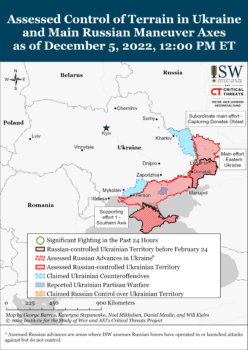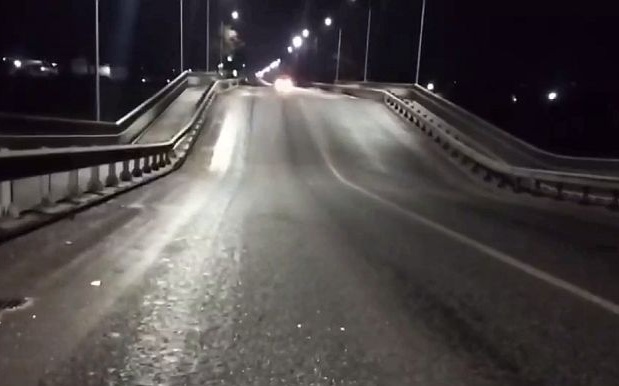Photo: Getty
Monday’s Coverage: Zelenskiy and Biden Discuss Air Defenses
EA on Times Radio: An Axis of Weakness — Russia, Iran, and the Ukraine Invasion

Source: Institute for the Study of War
UPDATE 1901 GMT:
Ukraine has met another key requirement for accession to the European Union.
The Ukrainian Parliament has repealed an old law and adopted a new one to “improve the protection of the rights of national minorities”, including “the rights to self-identification, the use of languages of national minorities, education, [and] participation in political, economic, social, and cultural life”.
Oleksandr Korniyenko, the Parliament’s first deputy speaker, tweeted:
Today, the @ua_parliament voted for all the necessary laws that pave the way for us to join the EU. We are looking forward to positive decisions for Ukraine. Ukraine is Europe! 🇪🇺🇺🇦 pic.twitter.com/TBswZl3KSs
— Oleksandr Korniyenko (@OlekKorn) December 13, 2022
UPDATE 1335 GMT:
The Kremlin has rejected Ukraine President Volodymr Zelenskiy’s proposal for negotiations based on Russian withdrawal from occupied Ukrainian territory.
Spokesman Dmitry Peskov said Ukraine must accept new territorial “realities” that the Kherson, Zaporizhzhia, Donetsk, and Luhansk provinces are Russia’s “new subjects”.
Peskov did not mention that Ukraine’s “realities” this autumn have been the liberation of part of the four provinces in the south and east of Ukraine.
Instead, he said “no progress is possible” unless Kyiv’s accepts Vladimir Putin’s “annexations”.
UPDATE 1323 GMT:
French Foreign Minister Catherine Colonna says more than €1 billion ($1.07 billion) of winter support for Ukraine has been raised at a Paris conference on “resilience”.
Colonna said the money, pledged by 46 countries and 24 international organisations, will be used for energy, food, water, health, and transportation.
President Volodymyr Zelenskiy had told the conference that Ukraine needs €800 million ($844 million) for winter provisions and €1.5 billion ($1.58 billion) to repair an energy grid damaged by Russian attacks.
Zelenskiy and French President Emmanuel Macron are co-hosting the conference, an effort to establish international coordination of essential assistance such as generators, transformers, equipment to restore high-voltage networks, and gas turbines (see Original Entry).
Zelenskiy said:
Every day our engineers have to disconnect millions of Ukrainians for these repairs. Currently there are 12 million. And every day we expect new Russian strikes. That’s why the generators have become as important as armor to protect the population.
First Lady Olena Zelenska, addressing the conference in person, asked:
How do you feel what this war is doing to our country and our people? How do you feel what more than 4,000 missiles that hit Ukrainian cities mean? What does 50,000 missiles launched in a single day against our country mean? What are 2,719 educational establishments affected or destroyed? How do you feel over 1,100 medical establishments destroyed or affected? Can you imagine half of France without electricity?
UPDATE 1318 GMT:
The UK has sanctioned 12 Russian commanders over attacks on Ukrainian cities.
Thosed cited include Maj. Gen. Robert Baranov, in charge of the programming and targeting of Russian cruise missiles.
The UK is also sanctioning four Iranians over Tehran’s provision of drones for Russian strikes. Citing British military intelligence, the Foreign Office said, “Russian armed forces are struggling to replenish their missile reserves, while they are increasingly forced to rely on second rate drones supplied by Iran to keep up their inhumane bombardments of the Ukrainian people.”
UPDDATE 0821 GMT:
The European Union has completed arrangements for €18 billion ($19 billion) in financial aid for Ukraine in 2023.
The EU member states broke a blockade by Hungary, whose President Viktor Orbán is close to Vladimir Putin.
Budapest relented on its opposition to the aid and to a global minimum corporate tax, in return for the release of EU funds designated for Hungary.
The bloc had held up €7.5 billion ($7.91 billion) because of Hungarian breaches of the rule of law over corruption, irregularities in public procurement, and conflicts of interest among government officials.
Last week the European Council circumvented the Hungarian veto through a mechanism in which the other member states, rather than the EU budget, would provide loan guarantees.
Ukraine War, Day 291: European Union Unblocks €18 Billion in Aid to Kyiv
UPDATE 0800 GMT:
On the eve of a G7 summit, Ukraine President Volodymyr Zelenskiy has appealed for an additional two billion cubic meters of natural gas and for modern tanks, artillery, shells, and long-range weapons.
In his video address to the G7 — the US, France, Germany, Italy, Japan, Canada, and the UK — Zelenskiy said:
I suggest Russia to at least try to prove that it is capable of abandoning the aggression. It would be right to start the withdrawal of Russian troops from the internationally recognized territory of Ukraine this Christmas.
If Russia withdraws its troops from Ukraine, it will ensure a lasting cessation of hostilities.
On Tuesday, Zelenskiy and French President Emmanuel Macron will co-chair a Paris conference on “resilience”, attended by up to 47 countries and 22 multilateral institutions.
Ukraine and France are planning a coordination mechanism to process Ukrainian requests for funding and supplies to cope with the winter and Russian missile strikes.
The conference will center on energy, water, food, transport, and health.
Jan Egeland, the head of the Norwegian Refugee Council, said on Monday that he anticipates another wave of hundreds of thousands of Ukrainian refugees “as the horrific and unlawful bombing of civilian infrastructure makes life unliveable in too many places”.
UPDATE 0755 GMT:
The US has made its first delivery of $13 million of power equipment to Ukraine.
A US official said two more planeloads of equipment will be sent this week. The shipments are part of $53 million announced last month, in rsponse to a Ukrainian appeal for transformers and generators amid waves of Russian attacks on energy infrastructure.
ORIGINAL ENTRY: Ukrainian forces have reportedly struck a bridge in Melitopol, occupied by the Russian invasion since March.
Both Russian proxy and Ukrainian officials reported the attack in the Zaporizhzhia region in southern Ukraine on Monday.
Vladimir Rogov, a Russian proxy administrator in Zaporizhzhia, posted video on Telegram of the damaged bridge and blamed Ukrainian “terrorists”. Ivan Fedorov, the exiled Ukrainian mayor of Melitopol, also shared video.
In the suburbs of the occupied #Melitopol in the Zaporizhzhia region of #Ukraine, a bridge was blown up, along which #Russian military equipment was transported from the east, traffic on the bridge was suspended. This was reported by the mayor of the city Ivan Fedorov. pic.twitter.com/GcM72IHJoV
— NEXTA (@nexta_tv) December 12, 2022
On Saturday, a Ukrainian rocket struck a barracks in occupied Melitopol in southern Ukraine, reportedly killing scores of Russian troops in a mess hall.
Exiled Mayor Fedorov said “panicking” Russian forces “are busy moving their military groups to other places to try to hide them”.
The attacks are similar to the approach of Ukrainian forces and partisans before their successful counter-offensive in the Kherson region this autumn. Aerial attacks and sabotage destroyed or damaged bridges, oil depots, Russian bases, and supply and logistics positions.
With the Russian military lines weakened, the Ukrainians advanced through the Kherson region. In November, they completed the liberation of territory west of the Dnipro River, including Kherson city.
In addition to setting up a possible advance in the Zaporizhzhia region, the attack on the Melitopol bridge puts further pressure on Crimea, occupied by Russia since 2014.
The route from Melitopol is vital for Russian military movements between Crimea and the rest of southern Ukraine.

